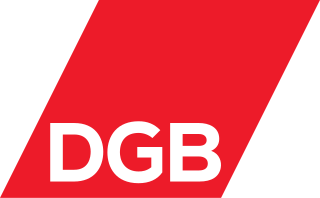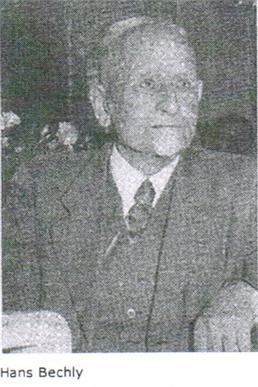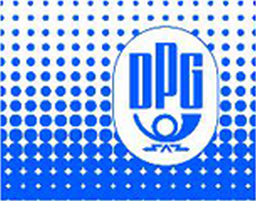In the fourteen years the Weimar Republic was in existence, some forty parties were represented in the Reichstag. This fragmentation of political power was in part due to the use of a peculiar proportional representation electoral system that encouraged regional or small special interest parties and in part due to the many challenges facing the nascent German democracy in this period.

Vereinte Dienstleistungsgewerkschaft is a German trade union based in Berlin, Germany. It was established on 19 March 2001 as the result of a merger of five individual unions and is a member of the German Trade Union Confederation (DGB). With around 1.9 million members, Verdi is the second largest German trade union after IG Metall. It currently employs around 3000 members of staff in Germany and has an annual income of approximately 454 million Euros obtained from membership subscriptions. The trade union is divided into 10 federal state districts and five divisions and is managed by a National Executive Board (Bundesvorstand) with nine members. Frank Bsirske was the chairman of Verdi from its founding in 2001 until September 2019, when Frank Werneke was elected.

The German Trade Union Confederation is an umbrella organisation for eight German trade unions, in total representing more than 6 million people. It was founded in Munich, 12 October 1949.

The Gewerkschaft der Polizei is a trade union in Germany. It represents 181,000 police employees, and is one of eight industrial affiliations of the German Confederation of Trade Unions (DGB). The GdP is one of the three trade unions for police employees in Germany, the other two being the Deutsche Polizeigewerkschaft - affiliated with the German Civil Service Federation - and the Bund Deutscher Kriminalbeamter, which is exclusively for members of the Kriminalpolizei.
Trade unions in Germany have a history reaching back to the German revolution in 1848, and still play an important role in the German economy and society.

T-Mobile Workers United (TU) is an organization of T-Mobile USA and Metro by T-Mobile employees joining together for a voice and fair treatment at work. It represents currently 500 members and is affiliated with the Communications Workers of America (CWA) and Vereinte Dienstleistungsgewerkschaft (ver.di), a large German service-sector union. TU is also supported by a coalition of community and labor groups around the world.
The General Commission of German Trade Unions was an umbrella body for German trade unions during the German Empire, from the end of the Anti-Socialist Laws in 1890 up to 1919. In 1919, a successor organisation was named the Allgemeiner Deutscher Gewerkschaftsbund, and then in 1949, the current Deutscher Gewerkschaftsbund was formed.

Hans Georg Wilhelm Bechly (1871–1954) was a German labor leader and trade unionist.

The Trade Union International Public Service and Allied is a section of the World Federation of Trade Unions representing public sector workers.

The German Postal Union was a trade union representing postal workers in Germany.

The Public Services, Transport and Traffic Union was a trade union representing transport and public service workers in West Germany.

The Trade, Banking and Insurance Union was a trade union representing workers in commerce and finance in Germany.

The Union of German Book Printers was a trade union representing printers in Germany.
A police union is a trade union for police officers. Police unions formed later than most other occupations, reflecting both a conservative tendency and relatively superior working conditions. The first police unions formed in the United States. Shortly after World War I, the rising cost of living, wage reductions, concerns over amount of rest and growing dissatisfaction among rank and file police officers led to a number of police strikes from 1918-1923 and the formation of police unions globally.
The International Artists' Lodge is a trade union section and former independent trade union, representing variety and circus performers in Germany.

The Central Union of Employees was a trade union representing white collar, private sector workers in Germany.
The Union of Office Employees of Germany was a trade union representing office workers in Germany.
Trade unions have historically been unrecognized by IBM. Since the company's foundation in 1911, it has not recognized any in the United States, despite efforts by workers to establish them from 1970 onward. In Germany and Australia, several trade unions have limited recognition from IBM.











